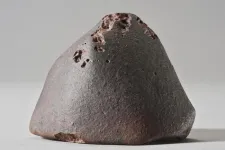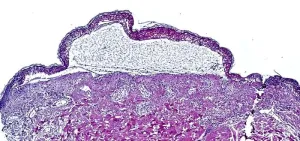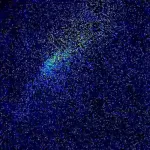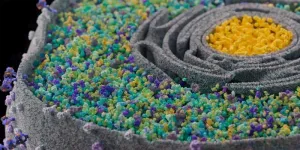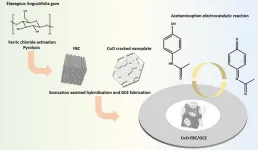(Press-News.org) About The Study: In this cohort study of pregnant individuals and offspring, exposure to maternal COVID-19 was not associated with abnormal neurodevelopmental screening results through 24 months’ postpartum. Continued study of diverse groups of children is needed because, among other factors, evidence suggests sensitivity of the developing fetal brain to maternal immune activation.
Corresponding Author: To contact the corresponding author, Eleni G. Jaswa, MD, MSc, MAS, email elenijaswa@gmail.com.
To access the embargoed study: Visit our For The Media website at this link https://media.jamanetwork.com/
(doi:10.1001/jamanetworkopen.2024.39792)
Editor’s Note: Please see the article for additional information, including other authors, author contributions and affiliations, conflict of interest and financial disclosures, and funding and support.
# # #
Embed this link to provide your readers free access to the full-text article This link will be live at the embargo time http://jamanetwork.com/journals/jamanetworkopen/fullarticle/10.1001/jamanetworkopen.2024.39792?utm_source=For_The_Media&utm_medium=referral&utm_campaign=ftm_links&utm_term=101624
About JAMA Network Open: JAMA Network Open is an online-only open access general medical journal from the JAMA Network. On weekdays, the journal publishes peer-reviewed clinical research and commentary in more than 40 medical and health subject areas. Every article is free online from the day of publication.
END
In utero exposure to maternal COVID-19 and offspring neurodevelopment through age 24 months
JAMA Network Open
2024-10-16
ELSE PRESS RELEASES FROM THIS DATE:
Feeling the heat: a new approach to controlling heat flow in crystals
2024-10-16
Tokyo, Japan – Unwanted heating of electronic components hinders the performance of many devices. For example, the processing speed and memory available to silicon-based computer chips depend strongly on the ability to dissipate heat effectively. Unfortunately, despite high demand, thermal management remains challenging.
Now, in a study published in Nature, a team of researchers led by the Institute of Industrial Science, the University of Tokyo, has demonstrated the ability to control heat transfer in graphite crystals. Their novel approach applies concepts from fluid ...
The origin of most meteorites finally revealed
2024-10-16
An international team led by three researchers from the CNRS1, the European Southern Observatory (ESO, Europe), and Charles University (Czech Republic) has successfully demonstrated that 70% of all known meteorite falls originate from just three young asteroid families. These families were produced by three recent collisions that occurred in the main asteroid belt 5.8, 7.5, and about 40 million years ago. The team also revealed the sources of other types of meteorites; with this research, the origin of more than 90% of meteorites ...
Breakthrough technology leads to life-saving treatment for deadly skin reaction
2024-10-16
The researchers used spatial proteomics to analyze skin samples from patients with toxic epidermal necrolysis. This cutting-edge approach, known as Deep Visual Proteomics, merges powerful microscopy with AI-driven analysis, laser-guided microdissection and ultimately ultra-high sensitivity mass spectrometry. They zoomed in on individual cells and studied them like never before, creating a map of the thousands of proteins driving this deadly reaction.
Thierry Nordmann, first author, clinician-scientist at the Max Planck Institute of Biochemistry and senior dermatologist at the Ludwig Maximilians Universität München explains: ...
One in three plants call islands home
2024-10-16
A new study has revealed that islands are home to around one in three of the world’s plant species, despite covering just over five per cent of the Earth’s land surface.
Dr Julian Schrader, from Macquarie University’s School of Natural Sciences, led a team of a dozen researchers from Australia, Germany, Spain, USA, Greece and Japan in analysing data on more than 304,103 plants – essentially all species known to science worldwide – uncovering a treasure trove of island biodiversity.
The team found 94,052 species are native to islands. Of these, 63,280 are endemic –found nowhere else in the world – representing 21 per cent of global plant diversity.
The ...
Challenging current understanding, study reveals rapid release of dopamine not needed for initiating movement
2024-10-16
The chemical messenger dopamine is an essential catalyst that fuels activities and behaviors ranging from movement to cognition and learning. However, neuroscientists have long debated whether these functions rely on rapid bursts of dopamine or on the neurochemical’s slower action.
A new study led by researchers at Harvard Medical School provides an answer.
The work, conducted in mice and published Oct. 16 in Nature, shows that initiating movement doesn’t require a rapid burst of dopamine but instead relies on slow activity of the chemical over time. By contrast, reward-oriented behaviors, related to ...
CSIRO research reveals marine heatwaves are underreported in the deep ocean
2024-10-16
While marine heatwaves (MHWs) have been studied at the sea surface for more than a decade, new research published today in Nature has found 80 per cent of MHWs below 100 metres are independent of surface events, highlighting a previously overlooked aspect of ocean warming.
The study was conducted by Australia’s national science agency CSIRO and the Chinese Academy of Sciences.
MHWs are prolonged temperature events that can cause severe damage to marine habitats, such as impacts to coral reefs and species displacement. These events are becoming more frequent due to global warming, with notable occurrences off Australia’s East ...
Meat without vegetables: How bacteria in our stomachs today can tell us what was on the menu for the first humans
2024-10-16
In a study published in Nature, Prof. Daniel Falush of the Shanghai Institute of Immunity and Infection (SIII) of the Chinese Academy of Sciences, Prof. Yoshio Yamaoka of Oita University, Japan, and Prof. Kaisa Thorell of Gothenberg University, Sweden uncovered fascinating new details about the long association of humans and our stomach bacteria.
Since its discovery in 1983, Helicobacter pylori has become notorious as the cause of around a million cases of stomach cancer a year as well as other life-threatening gastric diseases. The bacterium is ...
Protein interactions: Who is partying with whom and who is ruining the party?
2024-10-16
Inside cells, it's like in a packed dance club: hundreds are partying. Some keep to themselves, others make their way through the crowd, chatting to everyone they meet. Some just say a quick hello, others stay with their best friends. In this club, there are all kinds of different interactions between party-goers. The same is the case in cells with proteins.
Cells are filled with many different types of proteins that interact with each other and often work together in groups. These groups are called complexes ...
New biochar nanocomposite enhances detection of acetaminophen and uric acid in urine
2024-10-16
In recent years, the excessive use of acetaminophen (APAP) has become a significant human hazard and social burden. Rapid and automated electrochemical detection has emerged as a crucial method for measuring APAP concentration in human urine. This study explores a novel porous cobalt-derived biomass electrocatalyst material prepared from Elaeagnus angustifolia gum and investigates its electrochemical properties as well as its specific detection capability for APAP. Their work is published in the journal Industrial Chemistry & Materials on 18 July 2024.
Acetaminophen (APAP) is a commonly used analgesic and antipyretic ...
F. William Studier receives the 2024 Merkin Prize in ceremony at the Broad Institute for developing technology used to produce millions of doses of COVID-19 vaccines
2024-10-16
The 2024 Richard N. Merkin Prize in Biomedical Technology was awarded to F. William Studier of Brookhaven National Laboratory in a ceremony and symposium at the Broad Institute on September 17, 2024. The prize, created by the Merkin Family Foundation and administered by the Broad, recognizes novel technologies that have significantly improved human health and carries a $400,000 award. [Event Video]
Studier was announced as the winner in May for his development, in 1986, of an efficient, scalable method of producing ...
LAST 30 PRESS RELEASES:
Breaking the efficiency barrier: Researchers propose multi-stage solar system to harness the full spectrum
A new name, a new beginning: Building a green energy future together
From algorithms to atoms: How artificial intelligence is accelerating the discovery of next-generation energy materials
Loneliness linked to fear of embarrassment: teen research
New MOH–NUS Fellowship launched to strengthen everyday ethics in Singapore’s healthcare sector
Sungkyunkwan University researchers develop next-generation transparent electrode without rare metal indium
What's going on inside quantum computers?: New method simplifies process tomography
This ancient plant-eater had a twisted jaw and sideways-facing teeth
Jackdaw chicks listen to adults to learn about predators
Toxic algal bloom has taken a heavy toll on mental health
Beyond silicon: SKKU team presents Indium Selenide roadmap for ultra-low-power AI and quantum computing
Sugar comforts newborn babies during painful procedures
Pollen exposure linked to poorer exam results taken at the end of secondary school
7 hours 18 mins may be optimal sleep length for avoiding type 2 diabetes precursor
Around 6 deaths a year linked to clubbing in the UK
Children’s development set back years by Covid lockdowns, study reveals
Four decades of data give unique insight into the Sun’s inner life
Urban trees can absorb more CO₂ than cars emit during summer
Fund for Science and Technology awards $15 million to Scripps Oceanography
New NIH grant advances Lupus protein research
New farm-scale biochar system could cut agricultural emissions by 75 percent while removing carbon from the atmosphere
From herbal waste to high performance clean water material: Turning traditional medicine residues into powerful biochar
New sulfur-iron biochar shows powerful ability to lock up arsenic and cadmium in contaminated soils
AI-driven chart review accurately identifies potential rare disease trial participants in new study
Paleontologist Stephen Chester and colleagues reveal new clues about early primate evolution
UF research finds a gentler way to treat aggressive gum disease
Strong alcohol policy could reduce cancer in Canada
Air pollution from wildfires linked to higher rate of stroke
Tiny flows, big insights: microfluidics system boosts super-resolution microscopy
Pennington Biomedical researcher publishes editorial in leading American Heart Association journal
[Press-News.org] In utero exposure to maternal COVID-19 and offspring neurodevelopment through age 24 monthsJAMA Network Open

